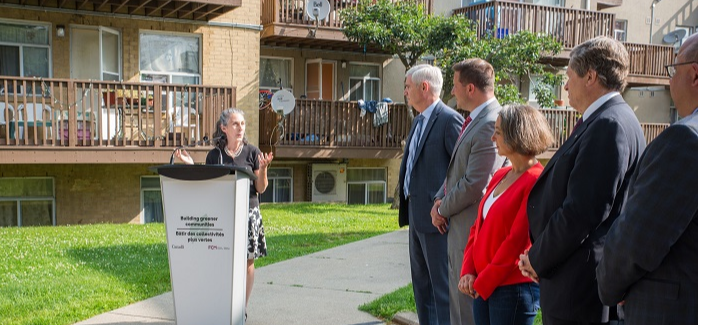| Project type | Amount | Community |
|---|---|---|
|
Capital project |
Grant: $750,000 |
Toronto and Hamilton, ON |

Nearly 44 per cent of people in urban areas live in apartments and condos, as stated in a report by the The Toronto Atmospheric Fund (TAF). If retrofitted to become more energy-efficient, these types of buildings could support national efforts to reduce GHG emissions. A key barrier is the lack of information available to support the technical and economic feasibility of these types of projects. The Accelerating Deep Energy Retrofits (ADER) project is changing that.
TAF, in partnership with the City of Toronto, is working to implement retrofits to four multi-residential buildings in the downtown Toronto area and in the City of Hamilton. The buildings, totaling 791 households, represent a range of ownership structures and residents, from young families to seniors, and include:
- Rental apartments
- A condominium
- Two low-income social housing buildings
The City of Hamilton will help develop lessons learned and best practices for future scale-up efforts, and will add a multi-unit residential complex to the initiative.
“We’re excited about this project’s ability to accelerate the adoption of retrofits around the country. My favourite thing about it is the opportunity to improve health and comfort for building residents, even as we reduce energy costs and carbon emissions. For example, heat pump technology not only dramatically reduces heating energy use, it also provides highly efficient air conditioning.”
—Bryan Purcell, Vice-President, Policy and Programs, The Toronto Atmospheric Fund
The average number of days above 30˚C in the Toronto area has increased by more than 50 per cent. This means residents of older, multi-family buildings are increasingly exposed to unhealthy temperature extremes. This project aims to dramatically reduce this type of exposure. TAF has already installed air-source heat pumps at two sites in the past year and has undertaken design work on the remaining buildings. These deep energy retrofits can reduce operating costs, improve indoor environmental quality and resident comfort and create local jobs.
“This is the best thing that has been done for [our] housing. It lowers [our] energy bills, provides heating and cooling. It's a lot colder in the summer and a lot warmer in the winter. You have more freedom and control,” says Diane Laidley, a resident at one of the Toronto ADER sites.
As a way to see firsthand how residents can benefit from the heating and cooling retrofits, TAF will also undertake a comprehensive monitoring and verification process to help ensure that the expected energy savings continue to materialize throughout the newly installed systems’ lifecycles.
The participants will widely share the knowledge gained from these projects through case studies, white papers and presentations.
This project will:
- Reduce GHG emissions by 546 tonnes C02e/year
- Reduce energy consumption and GHG emissions in the four buildings by at least 40 percent
- Reduce water consumption with the installation of new low-flow fixtures and ultra-low-flow toilets
Additional resources
Want to explore all GMF-funded projects? Check out the Projects Database for a complete overview of funded projects and get inspired by municipalities of all sizes, across Canada.

